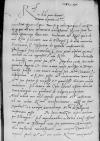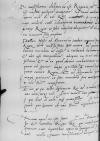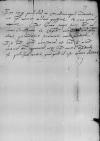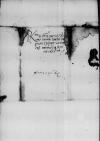Non est, quod mihi agat gratias Dominatio Vestra Reverendissima de iis, quae ad eius voluntatem a me praestantur, id enim facio ex debito officio erga illam meo. Declaravi{t} ⌊maiestati regiae⌋, quae a Dominatione Vestra Reverendissima ⌊⌋ tam de
Elbingensium, quam de aliis rationibus Pruthenicis et praesertim de articulis confirmandis. ⌊Elbingenses⌋ sunt commodius, quam fieri potuit, absoluti, quemadmodum ex eis cognoscet Dominatio Vestra Reverendissima. Alias res tractare hucusque non potuit ⌊sua maiestas⌋, impedita enim fuit multis gravibus negotiis et nunc animi causa paulisper in ⌊Niepolomicze⌋ secessit. Cum tamen redierit ⌊sua maiestas⌋ ⌊Cracoviam⌋, dabo operam, ut, si fieri possit, articuli confirmentur. Nam ipsa ⌊maiestas sua⌋ fatetur se recepisse et promisisse illorum confirmationem, sed tamen ⌊dominos consiliarios Poloniae⌋ instare dicit, ut ⌊Marienburgum⌋ ex generalitate de indigenis excipiatur. Aliud iudicio meo nihil impedit, quominus articuli confirmati ad Dominationem Vestram Reverendissimam transmittantur atque me scire expediret, an excepto ⌊Marienburgo⌋ articulus de indigenis confirmari possit.
De lacu ⌊Drauzen⌋ institi multum pro ⌊Elbingensibus⌋, sed impedientibus occultis consiliariis efficere non potui, ut Elbingenses voto suo potirentur. Exempla illa tractatuum ⌊Wratislaviensium⌋, cum venero ⌊Cracoviam⌋, reperiam facile et ad Dominationem Vestram Reverendissimam transmittam.
De ⌊Wosczkowa⌋ dubium non est ⌊regiam maiestatem⌋ non esse amplius quicquam mutaturam, sed tamen multum honoris inde Dominationi Vestrae Reverendissimae accederet, si opera sua eam mulierem cum adversariis reconciliaret, ne co[n]ventus regni, ut solet amplius obequitet, et
domini aures lamentis suis expleat.
Doctori ⌊Hosio⌋ ab ⌊Alexandro Sculteti⌋ negotium facess[i] ⌊regia maiestas⌋ molestissimo fert animo, ad quem d[a]buntur mandata, ut cesset a turbando homine qui[eto] et oleo ipso tranquilliore, alioquin ea in re nihil [pro]fecturus et in eo, quod obtinet, turbationem vicis[sim], quam non sperat, magis periculosam quam vanam sensu[rus]. Putat tamen ⌊regia maiestas⌋ ad ⌊Alexandri⌋ hono[rem] magis pertinere, ut sine mandatis suis auctorita[te] Dominationis Vestrae Reverendissimae compescatur.
⌊Eum⌋, qui tulit diplomata Romana ad Dominationem Vestram Reverendissim[am], non novi neque vidi. Fieri tamen non poterit, qu[in] si quae dicet in aula, mihi innotescant. Istum ... facile pro honore Dominationi Vestrae Reverendissimae respondere cu[ra]bo etc.
Nova apud nos ista sunt. Fuit hic orator ⌊r[egis] Ioannis⌋ et nuntius ⌊regis Romanorum⌋, qui rettulerunt ⌊Thurcum⌋ cum ingentibus copiis in ⌊Hungariam⌋ se d[emit]tere, velle primum ⌊Transilvaniam⌋ occupare, de[inde] ⌊Budam⌋ obsidere et expugnare, illicque hibernare. Reges petunt consilium et auxilium, quomodo tamen impetrabunt ab iis, qui ipsi auxilio indigent, facile Dominatio Vestra Reverendissima conicere potest.
Rediit iam in gratiam ⌊imperator⌋ cum ⌊rege Galliae⌋, post decennales enim indutias, quae factae sunt opera ⌊pontificis⌋, caesar cum rege Galliae apud ⌊Aquas Mortuas⌋ septem diebus simul commorati soli inter se certam pacem constituerunt.
⌊Reges Hungariae⌋ diviso imperio firmam pacem inter se titulis ab utraque parte integris manentibus constituerunt. Quae iam publicata in ⌊Hungaria⌋ fuisset, nisi adventus ⌊Thurci⌋ interturbasset.
Quae ab ⌊oratore nostro⌋ ex ⌊Thurcia⌋ in cifris scripta sunt, Dominationi Vestrae Reverendissimae mitto. Alia hic ad praesens non habentur, sed si erunt, scribam postea. Nunc etiam scripsissem copiosius, sed aegritudo non permisit. Quae nec ipsi mihi tantum potestatis fecit, ut manu mea scribere potuissem. Sed hoc facile mihi ignoscet Dominatio Vestra Reverendissima, cum non neglegentia, sed necessitate factum sit.
Cuius gratiae me iterum atque iterum commendo et illam felicissimam esse atque recte sanam ex animo opto.
Enclosure:
Cum pervenissem ⌊Andrinopolim⌋, venit obviam mihi unus czaus a ⌊caesare⌋, qui me diligenter admonuit, ut properarem ad ⌊caesarem⌋ et, priusquam venissem ⌊Constantinopolim⌋, habui obviam aliquot ex ⌊Thurcis⌋, qui me etiam festinare iubebant caesaremque iam dudum abivisse dicebant, nisi me exspectasset. Equi autem mei defecerant penitus, veni itaque ad ⌊Constantinopolim⌋ feria quarta post Visitationis Mariae. Exivit contra me ⌊Ionusbek⌋ et capitaneus czausorum cum reliquis czausis deduxeruntque ad hospitium et in duabus horis voc{a}atus sum ad ⌊Aiasbassam⌋, qui humaniter me excepit, cumque dixissem mihi commissum esse legationem omnem coram ipso solo ⌊imperatore⌋ referre, nihil penitus de legatione a me inquisivit. Mane vocando me ad ⌊imperatorem⌋ cumque venissem in consessum bassarum, inter alia coepi cum illis tractare de ⌊Oczakow⌋, quod ipsi male audiebant, mirabanturque, quod ⌊vestra
sacra
maiestas⌋, appetendo fraternitatem cum imperatore, postularet ea, quae diffidationem prae se ferrent. Cumque multos et longos tractatus super hac re fecissem dixissemque me omnino coram ⌊imperatore⌋ de ⌊Oczakow⌋ loqui velle, rogassemque, ut ipsi persuadeant imperatori suo id iustum esse et aequum, ut arx Oczakow restituatur, dixit ⌊Aiasbassa⌋: „Frater mi”, inquit, „ego sum amicus ⌊domino tuo⌋ cupioque, ut amicitia inter ⌊meum et tuum dominum⌋ diu maneat, sed timeo de legatione ista, ne aliquid oriatur novi. Quare rogo et consulo, uti verus amicus ⌊domini tui⌋, ne de hoc verbum faciat in conspectu ⌊domini nostri⌋, sed nostro, dum per tempus licebit, tibi dabo responsu[m]”. Locutus sum itaque omnia coram ⌊imperatore⌋ praeter ⌊Ocz
<a>
kow⌋ etc.
Die Lunae proxima, octava Iulii, exivit ⌊imperator⌋ in campum cum exercitu et ego cum ipso ibique in medio miliari ante ⌊urbem⌋ equo descenso deosculavi manum imperatoris usque in tentorio ibique per ⌊Aiasbassam⌋ responsum mihi est: „⌊Dominus noster⌋, licet alia habeat negotia, ecce iam nunc nunc vadit ad p[u]niendum ⌊inimicum⌋ ⌊domini tui⌋, dominus autem tuus vadat cum exercitu et illum ex illa parte constringat”.
Respondi ego me non certo scire, an ⌊vestra sacra maiestas⌋ hoc anno exercitum habere deberet.
Bassa respondit: „Scribe”, inquit,
„ad ⌊dominum tuum⌋, ut absque mora milites suos mittat in confinia ⌊Valachiae⌋, qui diligenter custodiant, ne aliquorsum aufugiant et praesertim per ⌊Lithuaniam⌋”. Pro ⌊Wlodek⌋ et aliis captivis misit ⌊Vlacos⌋ ad ⌊Valachoh(!)⌋, ut absque mora omnes ad se remittat. Ego itaque paululum in ⌊Andrinopoli⌋ commorabor, ut ipsi interim adduci possint et una mecum veniant.
De ⌊Baro⌋ scriptae sunt litterae ad omnes sendzacos et capitaneos, ut Barum cum omnibus aliis pertinentiis securitate omni gaudeat.
Est autem omnino necessarium, ut ⌊vestra sacra maiestas⌋
<mittat>
exercitum bene apparatum neque enim omnino confidendum est pulchris verbis,
cf. Verg. A. 2.49 quidquid id est, timeo Danaos et dona ferentis ⌊quicquid id est, timeo Danaos etc.cf. Verg. A. 2.49 quidquid id est, timeo Danaos et dona ferentis ⌋






